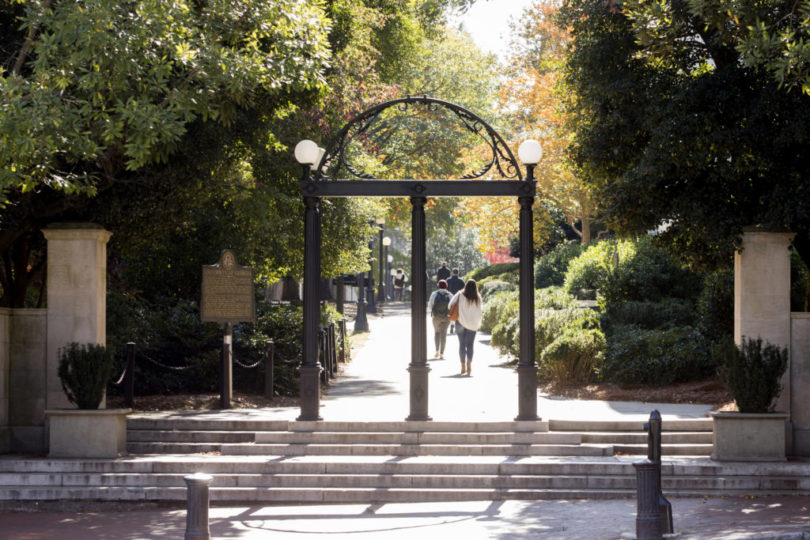The 17th International Conference on Remote Engineering and Virtual Instrumentation drew scientists and industry leaders from around the world to the University of Georgia to share the latest research, insights and trends in cross reality and data science in engineering.
The three-day conference, hosted by the University of the Georgia College of Engineering and the International Association of Online Engineering, showcased advances in online engineering, cyber-physical systems and the Internet of Things, that promise to propel advances in a range of industries and academia.
“When this annual gathering began in 2004, the internet was not yet ten years old and Google had just been born,” said Michael Auer, CEO of the International Association of Online Engineering. “At that time, we didn’t know about many of the technologies we take for granted today. Now, online technologies are the core of many fields of engineering, if not the whole society.”
Much of the research presented at the event focused on how digital technologies, such as cross reality technologies, remote engineering, and big data, can spur success in teaching and learning in engineering education. For example, universities and educators around the globe are beginning to use virtual and augmented reality equipment or advanced online technology in their courses. This approach can make courses more flexible and bring the classroom closer to the professional world. Also, business and industry have successfully leveraged artificial intelligence and machine learning to drive profits—what are the opportunities and risks of using similar technologies to shape future generations of scientists?
Presenters also discussed how shifting demographics and the pace of advances in technology are contributing to a skills gap in the workforce. Industry leaders estimate that in less than 10 years, jobs in advanced manufacturing, engineering, and computing will each grow by double digits. Presenters said industry and academia must partner to prepare a workforce ready for Industry 4.0, in which computers are connected and communicate with one another to ultimately make decisions without human involvement.
“With more and more connected systems and each of these systems sourcing tons of data, the ability to assimilate, validate and analyze the data is a big challenge. Further presenting the data as useful and perceivable information is even more of a challenge,” said Kalyan Ram Bhimavaram, president of IAOE and CEO of Electrono Solutions. “The theme of this conference are exactly focused on the aspects of assimilating, validating and analyzing such data and the representation of that data in the field of engineering.”
Researchers representing universities from around the globe presented research posters and papers, with awards presented in four categories:
• Best Full Paper: “FPGA Remote Laboratory: Experience in UPNA and UNIFESP.” Cándido Aramburu Mayoz, Ana Lúcia da Silva Beraldo, Aitor Villar-Martinez, Luis Rodriguez-Gil, Wilson Francisco Moreira de Souza Seron, Tiago de Oliveira, and Pablo Orduña (Public University of Navarre, Spain; Universidade Federal de São Paulo, Brazil; LabsLand; University of Deusto, Bilbao, Spain);
• Best Short Paper: “Remote Lab to Illustrate the Influence of Process Parameters on Product Properties in Additive Manufacturing.” Siddharth Upadhya, Joshua Grodotzki, Alessandro Selvaggio, Oleksandr Mogylenko and A. Erman Tekkaya (Institute of Forming Technology and Lightweight Components, TU Dortmund, Germany);
• Best Student Paper: “Programmable Remote Laboratory for Mobile Robots.” Rafael Franco-Vera, Xuemin Chen and Wei Wayne Li (Texas Southern University); and
• Best Work in Progress: “Using Augmented Reality Mobile App to Improve Student’s Skills in Using Breadboard in an Introduction to Electrical Engineering Course.” Adel Al Weshah, Ruba Alamad, and Dominik May (University of Georgia, The University of Akron).
Held at UGA’s Georgia Center for Continuing Education and Hotel, the February conference was co-organized by UGA’s Engineering Education Transformations Institute and UGA’s Georgia Informatics Institutes for Research and Education. Dominik May, an assistant professor in the UGA College of Engineering, served as the conference chair. Support was provided by industry and nonprofit partners Phoenix Contact, LabsLand, Siemens, Underwriters Laboratories, the International E-Learning Association and the Institute of Electrical and Electronics Engineers.








